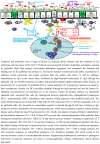Probiotics, prebiotics and immunomodulation of gut mucosal defences: homeostasis and immunopathology
- PMID: 23760057
- PMCID: PMC3725482
- DOI: 10.3390/nu5061869
Probiotics, prebiotics and immunomodulation of gut mucosal defences: homeostasis and immunopathology
Abstract
Probiotics are beneficial microbes that confer a realistic health benefit on the host, which in combination with prebiotics, (indigestible dietary fibre/carbohydrate), also confer a health benefit on the host via products resulting from anaerobic fermentation. There is a growing body of evidence documenting the immune-modulatory ability of probiotic bacteria, it is therefore reasonable to suggest that this is potentiated via a combination of prebiotics and probiotics as a symbiotic mix. The need for probiotic formulations has been appreciated for the health benefits in "topping up your good bacteria" or indeed in an attempt to normalise the dysbiotic microbiota associated with immunopathology. This review will focus on the immunomodulatory role of probiotics and prebiotics on the cells, molecules and immune responses in the gut mucosae, from epithelial barrier to priming of adaptive responses by antigen presenting cells: immune fate decision-tolerance or activation? Modulation of normal homeostatic mechanisms, coupled with findings from probiotic and prebiotic delivery in pathological studies, will highlight the role for these xenobiotics in dysbiosis associated with immunopathology in the context of inflammatory bowel disease, colorectal cancer and hypersensitivity.
Figures
Similar articles
-
Probiotics and gut microbiota: mechanistic insights into gut immune homeostasis through TLR pathway regulation.Food Funct. 2022 Jul 18;13(14):7423-7447. doi: 10.1039/d2fo00911k. Food Funct. 2022. PMID: 35766374 Review.
-
Mechanisms and immunomodulatory properties of pre- and probiotics.Benef Microbes. 2019 Apr 19;10(3):225-236. doi: 10.3920/BM2018.0066. Epub 2019 Mar 4. Benef Microbes. 2019. PMID: 30827150 Review.
-
Potential Impacts of Prebiotics and Probiotics on Cancer Prevention.Anticancer Agents Med Chem. 2022;22(4):605-628. doi: 10.2174/1871520621999201210220442. Anticancer Agents Med Chem. 2022. PMID: 33305713 Review.
-
Probiotics and prebiotics associated with aquaculture: A review.Fish Shellfish Immunol. 2015 Aug;45(2):733-41. doi: 10.1016/j.fsi.2015.05.038. Epub 2015 Jun 1. Fish Shellfish Immunol. 2015. PMID: 26044743 Review.
-
Prebiotics and probiotics: their role in the management of gastrointestinal disorders in adults.Nutr Clin Pract. 2012 Apr;27(2):195-200. doi: 10.1177/0884533611423926. Epub 2011 Nov 29. Nutr Clin Pract. 2012. PMID: 22127952 Review.
Cited by
-
Molecular and cellular characterization of immunity conferred by lactobacilli against necrotic enteritis in chickens.Front Immunol. 2023 Nov 7;14:1301980. doi: 10.3389/fimmu.2023.1301980. eCollection 2023. Front Immunol. 2023. PMID: 38022592 Free PMC article.
-
Effect of Different Pig Fecal Microbiota Transplantation on Mice Intestinal Function and Microbiota Changes During Cold Exposure.Front Vet Sci. 2022 Apr 13;9:805815. doi: 10.3389/fvets.2022.805815. eCollection 2022. Front Vet Sci. 2022. PMID: 35498721 Free PMC article.
-
Linoleic Acids Overproducing Lactobacillus casei Limits Growth, Survival, and Virulence of Salmonella Typhimurium and Enterohaemorrhagic Escherichia coli.Front Microbiol. 2018 Nov 1;9:2663. doi: 10.3389/fmicb.2018.02663. eCollection 2018. Front Microbiol. 2018. PMID: 30443248 Free PMC article.
-
The Effect of Akkermansia muciniphila and Its Outer Membrane Vesicles on MicroRNAs Expression of Inflammatory and Anti-inflammatory Pathways in Human Dendritic Cells.Probiotics Antimicrob Proteins. 2024 Apr;16(2):367-382. doi: 10.1007/s12602-023-10058-6. Epub 2023 Mar 8. Probiotics Antimicrob Proteins. 2024. PMID: 36884184
-
Probiotics improve glucose and lipid metabolism in pregnant women: a meta-analysis.Ann Transl Med. 2019 Mar;7(5):99. doi: 10.21037/atm.2019.01.61. Ann Transl Med. 2019. PMID: 31019949 Free PMC article.
References
-
- FAO/WHO. Guidelines for the Evaluation of Probiotics in Food. 2002. [(accessed on 1 May 2013)]. Available online: ftp://ftp.fao.org/es/esn/food/wgreport2.pdf.
-
- Nilsson A.C., Östman E.M., Holst J., Björk I.M. Including indigestible carbohydrates in the evening meal of healthy subjects improves glucose tolerance, lowers inflammatory marks, and increases satiety after subsequent standardized breakfast. J. Nutr. 2008;138:732–739. - PubMed
Publication types
MeSH terms
Substances
LinkOut - more resources
Full Text Sources
Other Literature Sources


